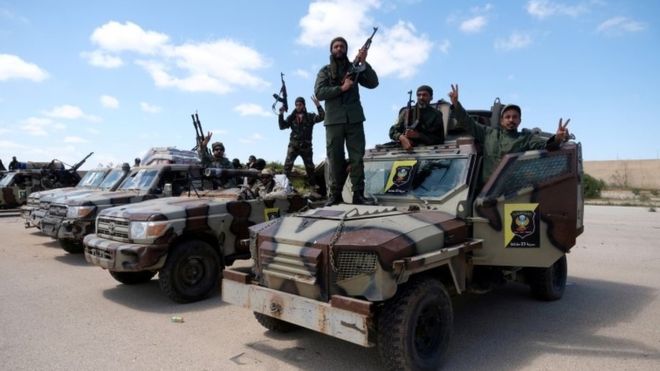The fighting has threatened to plunge Libya into the kind of violent chaos to rival the 2011 conflict that ousted and killed the long-time dictator Muammar Gaddafi. Since then, the country has been racked by civil war, with no authority in full control. The latest episode of conflict started in April last year, when Gen Haftar launched an attack on Tripoli in an attempt to oust the GNA. But eight months on, the battle continues with the GNA keeping Gen Haftar's forces at bay on Tripoli's southern outskirts. In recent weeks, the fighting escalated after Gen Haftar announced a new offensive aimed at taking control of Tripoli and ousting Fayez al-Sarraj’s GNA. The LNA had tried and failed to do the same in April.
Ankara, with NATO’s second-largest army, has hinted for weeks that it would flex its military muscle in Libya to defend the embattled GNA government, which is also supported by Qatar. Erdogan has already been sending weapons and drones to the GNA and allied Islamist militias despite a UN arms embargo. Turkey has also in the past couple of weeks reportedly recruited Syrian rebel fighters it backs and sending them to Libya. That has elicited protests from Haftar’s backers, including the United Arab Emirates and Egypt, the latter of which organised an emergency summit of the Arab League this week to discuss Libya.
Meanwhile, Turkey recently signed two controversial agreements with Tripoli: a memorandum of understanding on providing the GNA with arms, training, and military personnel; and a November 28 maritime agreement delineating exclusive economic zones in the Mediterranean waters separating the two countries.
The latter move drew protests from Greece and Egypt and was condemned “unequivocally” by the European Council but in Erdogan’s view, drawing this line will allow him to cut into the emerging Cypriot-Egyptian-Greek-Israeli maritime bloc, while simultaneously pushing back against Egypt and the UAE’s pressure on the GNA. Over the last five years, the Eastern Mediterranean has witnessed major discoveries of gas fields in Greece, Cyprus and Israel. But it was the discovery of the Egyptian Zohr field, the biggest gas field in the Mediterranean, that was seen as a game-changer, paving the way for Egypt to be the region’s energy hub. The Eastern Mediterranean Gas Forum, a Cairo-based body that aims to create a regional gas market to benefit member states, was established. While it includes most of the region’s states in its membership, Turkey was notably not invited. For Erdogan, this was a move to stack the cards against his country, and he felt eager to retaliate, showing he is prepared to act tough to get his way and force new negotiations over their long-standing disputes.

Turkey has said the military pledge is in support of an internationally government in Libya and to safeguard its interests in the country and in the eastern Mediterranean. Other analysis, however, have interpreted the Turkish moves as primarily motivated by its vital need to shape the region’s future in its own favour and an indication of Libya’s emerging status as focal point of Ankara’s foreign policy, which seemingly regards the country as an arena for Turkish proxy competition with rivals old (Greece) and new (Egypt and the UAE).
Turkey’s Libyan gambit threatens to complicate its relationship with Moscow, a key backer of Syrian President Bashar Assad, which has expressed concern about the prospect of Turkish troops being deployed to Libya. Libya’s GNA has become increasingly dependent on Ankara for military reasons—namely, a lack of other allies willing to provide arms capable of countering the LNA’s Emirati-supplied drones, and the introduction of Russian mercenaries from the private Wagner group in September upended the balance of power and allowed LNA troops to seize control of key towns south of Tripoli. Erdogan has voiced opposition to the Wagner group supporting Haftar's forces. "Russia is there with 2,000 Wagner [fighters]," the Turkish leader said last month, also pointing out that some 5,000 Sudanese fighters were in Libya. "Is the official government inviting them? No."
The US believes that Russian air defences may also have been provided to Gen Haftar's forces Washington insists that last November one of their UAVs was brought down by Russian missiles. The US operates over Libya against remnants of ISIS – a further illustration of the multifaceted and fractured situation on the ground. Russia denies any active involvement in the fighting. Attention is now on a planned January 8 visit by President Vladimir Putin to Turkey, where he will attend the opening of the TurkStream natural gas pipeline. The trip is likely to be dominated by discussions on Syria and the Turkish parliament's vote to send troops to Libya.
The move is also likely to increase divisions between Washington and Ankara. President Trump faced a fierce backlash in October after effectively giving the green light to a Turkish military operation in Syria. He is under pressure from Republican members of Congress — who are threatening to impose sanctions on Ankara — to take a tougher stance towards Erdogan on a range of issues, including a regional dispute over gas in the eastern Mediterranean.
It also raises the stakes with Egypt, which has been at odds with Turkey since the Egyptian military removed Islamist President Mohamed Mursi in 2013 from power. The UAE and Saudi Arabia have also become increasingly angered by what they view as Turkey’s meddling in the Arab world, from its support for Islamist groups such as the Muslim Brotherhood to its intervention in north-east Syria and its backing of Qatar in a more than two-year dispute between rival Gulf states. Cairo condemned the parliamentary vote in the “strongest terms” and warned that any Turkish military intervention in Libya would have a “negative impact” on stability in the Mediterranean and accused Ankara of supporting terrorist organisations in the country.






